Taiwan’s housing market is gaining momentum
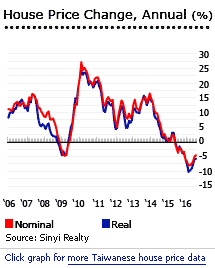 After two years of house price falls, Taiwan's property market is gaining momentum. House prices are rising gradually. Demand is surging. Residential construction activity is also increasing again.
After two years of house price falls, Taiwan's property market is gaining momentum. House prices are rising gradually. Demand is surging. Residential construction activity is also increasing again.
Taiwan's Lutheran home price index increased 0.94% (0.37% inflation-adjusted) during the year to Q2 2017, in contrast with a decline of 3.3% during the same period last year, according to Sinyi Real Estate Planning and Research. During the latest quarter (Q2, 2017), nationwide house prices rose by 1.48% (1.28% inflation-adjusted).
All the country's major cities show signs of improvement.
- In Taipei, the capital, house prices fell by 1% (-1.6% inflation-adjusted) during the year to Q2 2017, after y-o-y declines of 4.4% in Q2 2016 and 6.6% in Q2 2015.
- In Xinbei, house prices fell by just 0.9% (-1.5% inflation-adjusted) y-o-y in Q2 2017, after annual declines of 4.1% in Q2 2016 and 1.37% in Q2 2015.
- In Taoyuan, house prices rose by 2.7% (2.2% inflation-adjusted), after annual declines of 4.6% in Q2 2016 and 2.3% in Q2 2015.
- In Hsinchu, house prices rose by 2.8% (2.2% inflation-adjusted), after y-o-y decline of 0.5% in Q2 2016 and an annual rise of 2% in Q2 2015.
- In Taichung, house prices rose by 2% (1.5% inflation-adjusted), from an annual decline of 3.2% in Q2 2016 and a rise of 1.3% two years ago.
- In Kaohsiung, house prices increased 4.3% (3.8% inflation-adjusted), from y-o-y decline of 2.5% a year earlier and an annual increase of 9.2% in Q2 2015.
Property transactions in Taiwan's six major metropolitan areas (Taipei, New Taipei, Taoyuan, Taichung, Tainan, and Kaohsiung) rose by 20% during the first half of 2017, compared to the same period last year, based on government statistics. This contrastswith a sharp decline in property demand during 2016.
Residential construction licenses increased 4.1% y-o-y in the first half of 2017, after falling by 26% in 2016, 14% in 2015, and 7% in 2014, according to the Ministry of Interior.
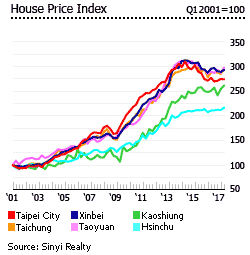
The housing market will improve further this year, with property transactions expected to increase by about 6% y-o-y to 260,000 units, according to Tseng Ching-der of Sinyi Realty Inc.
Taiwan's economy grew by 1.4% in 2016, up from 0.7% growth in 2015 - still far below the average annual growth rate of 4.5% from 2010 to 2014. Recently, the Taiwanese government raised its GDP growth forecast for 2017 to 2.05% from the last estimate of 1.92%, according to the Directorate General of Budget, Accounting and Statistics (DGBAS), due to strong global demand for smartphones and other hi-tech electronic gadgets.
Demand rising again
In 2016, property transactions fell by 16% from a year earlier to the lowest level since 2001, according to the Ministry of Interior. Transactions in the six major cities dropped 16.6% in 2016 from a year earlier, after property tax measures took effect on January 1, 2016 imposeda capital gains tax of up to 45% on homeowners selling second homes within six years from date of purchase.
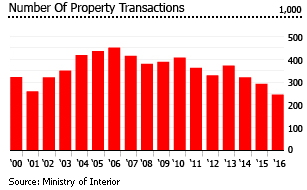
However the adverse impact of the introduction of new property-related tax measures last year is now fading. All the country's major metropolitan areas, except Taoyuan, saw rising property transactions in June 2017:
- In New Taipei, property transactions surged 48% y-o-y to 5,614 units in June 2017.
- In Taipei, the capital city, property sales rose by 8.2% y-o-y to 2,188 units.
- In Taoyuan, transactions dropped 12.7% y-o-y to 3,483 units.
- In Taichung, transactions soared by 42.6% y-o-y to 3,895 units.
- In Tainan, transactions rose by 23.3% y-o-y to 1,823 units.
- In Kaohsiung, transactions rose by 9.2% y-o-y to 3,348 units.
Housing affordability remains a major problem
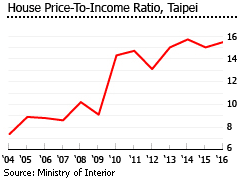
Taipei is one of the world's most expensive cities. Taipei's house price-to-income ratio stood at 15.18 in 2016, higher than London (8.5x), New York (5.7x), or Sydney (12.2x). Hong Kong scored 18.1, according to the research group Demographia. Taipei City's house price-to-income ratio has risen from just 7.4 in 2004, according to the country's Ministry of Interior.
"Unaffordability remains a serious issue, as a reasonable home price-to-income ratio is between 4 and 6," said Linda Chou, land economics professor at Takming University of Science and Technology. "Higher ratios would translate into heavy debt burdens and deprive home owners of a decent quality of life."
Housing demand wasboosted after 2009when the government cut inheritance tax rates from 50% to 10%, and interest rates were cut. Unmonitored speculation, low housing supply, and a long tradition of homeownership have pushed house prices in Taiwan, particularly in the capital city, and particularly on high-end properties. A three-bedroom apartment, which cost just TWD6 million to TWD7 million in 1995, was sold for about TWD20 million last year.
FRom 2001 to 2016:
- In Taipei City, the house price index rose by 187% (144% inflation-adjusted)
- In Xinbei, the house price index rose by 199% (154% inflation-adjusted)
- In Taoyuan, the house price index rose by 171% (130% inflation-adjusted)
- In Hsinchu, the house price index rose by 118% (86% inflation-adjusted)
- In Taichung, the house price index rose by 208% (162% inflation-adjusted)
- In Kaohsiung, the house price index rose by 147% (110% inflation-adjusted)
"Unfortunately, buying a home remains unaffordable for most young Taiwanese, a situation we don't expect to change in the medium term," said Emily Dabbs of Moody's Analytics. An average household in Taipei needs to pay two-thirds of income for a mortgage loan, far above the affordable limit of 30%.
Dramatic measures continue to hit owners of luxury properties
Worries about mainland speculators peaked in early 2008 when residential property prices rose by more than 10% y-o-y during the first quarter. Upward pressure increased as Chinese banks based in Taiwan were able to offer mortgages after the signing of an MOU in November 2009.
From October 2009 the central bank has actively urged banks to closely monitor mortgage-lending risks, asking banks to reduce loan-to-value ratios, raise interest rates, and remove grace periods related to loans for investment properties. The central bank also conducted a round of targeted examinations related to real estate lending.
A major macro-prudential measure was to assign a 100% risk weighting to non-owner occupied residential mortgages. Risk weightings for other home mortgage portfolios range from 50% to 80%, compared with 10%-20% for banks in developed markets in the Asia-Pacific that practice the Internal Ratings-Based Approach to credit risk.
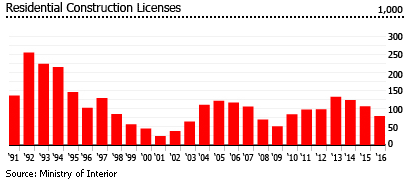
A luxury tax scheme was introduced in July 2011, with second homes not occupied by the owner and sold within one year of purchase taxed at 15%, and those sold within two years of purchase taxed at 10%.
In March 2014, property taxes on non-owner-occupied residential properties were raised to between 1.5% and 3.6%, from the current range of 1.2% to 2%.
Inspections of pre-sale house transactions were tightened. State-owned bank lowered loan-to-value ratios for first-time buyers from 80% to 70%, and to 50% to 60% for people owning more than one property.
A new property gains tax of as much as 45% took effect on January 1, 2016. Property sellers are now required to pay between 15% and 45% of gains based on market prices, instead of the previously used government-assessed values. Qualified property sellers with gains of less than TWD4 million (US$120,000) are exempt from the tax.
The result has been a significant decline in luxury property prices.
In the Dazhi District (dubbed as "Taipei's Green Silicon Valley"), located on the north side of the Keelung River across Taipei's city center, luxury apartments sold for an average price of TWD1.445 million (US$47,688) per ping (equivalent to 3.3 square meters) in 2016, down more than 50% from the peak price of TWD2.906 million (US$95,904) per ping.
In Zhongzheng District, located at the heart of Taipei and houses most of the country's government offices, luxury apartments sold for an average price of TWD1.079 million (US$35,609) per ping in 2016 - down by 9.6% from a previous low of TWD1.194 million (US$39,405) per ping.
Interest rates and the mortgage market
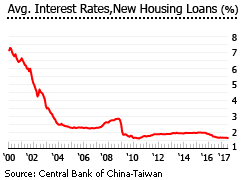
Despite the low interest rate environment, housing loans have hardly increased since 2009, as a result of the macro-prudential measures adopted by the central bank.
Interest rates for housing loans in Taiwan are among the lowest in the region. The average interest rate for housing loans stood at 1.976% in July 2017, slightly up from 1.958% a year earlier. The Central Bank of the Republic of China (Taiwan)'s benchmark interest rate currently stands at 1.375%, unchanged since June 2016 when it was cut by 12.5 basis points.
Although total outstanding housing loans grew by an average of 4.2% annually from 2009 to 2016, they remained absolutely steady as proportion of GDP from 2009 to 2016, at 37% of GDP.
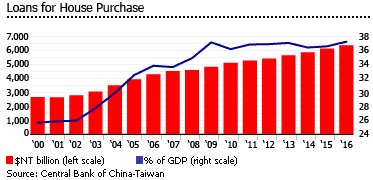
Possibly as a result of the impact of the property gains tax on the luxury sector, during the first seven months of 2017, the amount of new housing loans dropped almost 29% from a year earlier, to TWD221 billion (US$7.29 billion), according to the central bank.
Most residential mortgages in Taiwan are variable rate, with an average maturity of 25 years.
Taiwan's vanishingly low rental yields
Taipei now vies with Monaco for the lowest yields in the world. Taipei is not a happy place to be a landlord. The owner of an apartment in Taipei will be lucky to realize 2% yields, except on the very smallest apartments. Currently, average rental yields in Taiwan hover around 1.5%.
Such low yields are often a sign of an overvalued market. Given that the Global Property Guide's figures are for gross rental yields, i.e., do not make any allowance for vacant periods, for legal costs, administration costs, cleaning and repairs, rental taxes, property taxes, and other taxes, it is safe to say that landlords in Taiwan earn nothing on their apartments.
Paradoxically Taiwan has one of the highest home ownership rates in the world at 87%, while social housing accounts for about 5% of households. And the trend towards home ownership is increasing. Because of this, Taiwan's rental market is quite small, around 8% of around seven million households.
China-Taiwan relations reached new low after Tsai Ing-wen took power
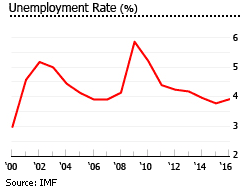
In the January 2016 presidential elections, Tsai Ing-wen led the Democratic Progressive Party (DPP) to landslide victory and became Taiwan's first female president.
One of Tsai's key economic policies is to reduce Taiwan's reliance on mainland China, which accounts for around 40% of the island's exports. Tsai plans to form closer ties with the ASEAN.
Mainland China is highly suspicious of Tsai, warning her against any attempt at a formal breakaway. Last year, the Chinese government announced that it had cut off official contact with Taipei. In December 2016, Taiwan sent a blunt message to China by preparing its military forces and stepping up its training exercises to fend off Beijing's threats.
In May 2017, their relations reached a new low after China decided to boycott the Olympic-style sporting event, 2017 Summer Universiade, which will be held in Taipei in August 2017.
In June 2017, Panama severed diplomatic ties with Taiwan and forged relations with China, after the latter's massive investment in the country. The decision follows a similar move last December by Sao Tome and Principe.
Relations between mainland China and Taiwan thawed after President Ma of the Kuomintang Party (KMT) assumed office in May 2008. He vowed greater cooperation with mainland China and denounced independence for Taiwan, a sharp contrast to his nationalist but corrupt predecessor, Chen Shui-bian. In November 2009, several memorandums of agreement between Taiwan and China on financial cooperation were signed. These gestures reassured investors and home buyers alike. In June 2010, an Economic Cooperation Framework Agreement (ECFA) was signed by Taiwan and China. President Ma also accepted the 1992 consensus, which played a crucial role in lowering tensions with China and boosting cross-strait economic ties.
Ma was reelected in the 2012 presidential elections. Cross-straits trade nearly doubled during Ma's term, reaching US$198 billion in 2014. Tourism flourished, with nearly three million Chinese tourists a year.
Since her election in January, Tsai has been faced challenges - criticisms of indecisiveness, a weak economy, labour protests and rows over personnel appointments, and a missile mistakenly fired towards mainland China.
Economic outlook improving
The Taiwanese government recently raised its GDP growth forecast for 2017 to 2.05% from the last estimate of 1.92%, according to the Directorate General of Budget, Accounting and Statistics(DGBAS). This was mainly due to improving exports driven by strong global demand for smartphones and other hi-tech electronic gadgets.
In the second quarter of 2017, the economy expanded by 2.1% from a year ago, from annual growth rates of 2.6% in the previous quarter and 0.7% in the same period last year.
Taiwan, heavily dependent on exports, was seriously affected by the US economic recession in 2008. The economy bounced back in 2010 with spectacular growth of 10.6%, but since then growth has been modest. The Taiwanese economy grew by just 1.4% last year, after annual growth rates of 0.7% in 2015, 4% in 2014, 2.2% in 2013, 2.1% in 2012, 3.8% in 2011, and 10.6% in 2010, according to the International Monetary Fund (IMF).
The country's real exports and imports are expected to increase this year by 3.95% and 3.85%, respectively, according to DGBAS.
In July 2017, inflation stood at 0.77%, down from 1.23% during the same period last year, according to the National Statistics. Inflation of 0.95% is expected this year, according to DGBAS.
In June 2017, unemployment stood at 3.74%, according to the National Statistics. Nationwide unemployment rate averaged 4.34% from 2000 to 2016.
There were about 440,000 unemployed people in Taiwan in June 2017, down from 459,000 in the previous year.